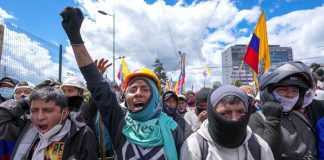Burma’s opposition leader Aung San Suu Kyi was released in November after spending most of the last 20 years under house arrest. It’s welcome that she’s free. But hopes that this will be the start of a shift from a military dictatorship to democratic government are premature.
The Burmese junta is confident because its candidates won an overwhelming victory in a rigged general election just six days before her release. They hope that letting her go will quieten anger at the way the election was conducted.
The junta has previously released her from house arrest in 1995 and 2002, only to re-arrest her when she appeared to be a threat. The regime still holds more than 2200 other political prisoners, and it is illegal for workers to form or be part of a trade union.
Western companies are keen to normalise relations with the Burmese regime and will use Suu Kyi’s release as an excuse. Australia continues to trade with Burma.
Suu Kyi appeared to be prepared to go along with this, stating, “If the people really want sanctions to be lifted, I will consider it.”
She later tried to balance this with the call for a “peaceful revolution”.
However Suu Kyi’s resolutely moderate politics can offer the false hope that a compromise with the generals is the way forward.
She has said, “I don’t want to see the military falling. I want to see the military rising to dignified heights of professionalism and true patriotism.”
The opposition is currently weak. Suu Kyi’s political party, the National League for Democracy, was banned earlier this year. The junta is securing its position rather than planning an exchange of power. Otherwise it’s business as usual in their near 50 years of rule.
The best hope of change came in the late 1980s when mass revolts shook the country. It was these that caused the junta to allow relatively free elections in 1990.
Suu Kyi herself was banned from standing and it was in the run-up to the election that her house arrest began. Despite this the National League for Democracy won 392 seats. The regime got ten. The generals refused to step down. Instead they cracked down on the opposition—including banning trade unions.
Discontent has simmered ever since, sometimes taking to the streets. The last time the regime felt threatened was in 2007, when Buddhist monks led a series of protests demanding political change.
More than 100,000 people marched peacefully through the main city Rangoon, but the government’s response was a brutal crackdown.
Socialist Worker UK





